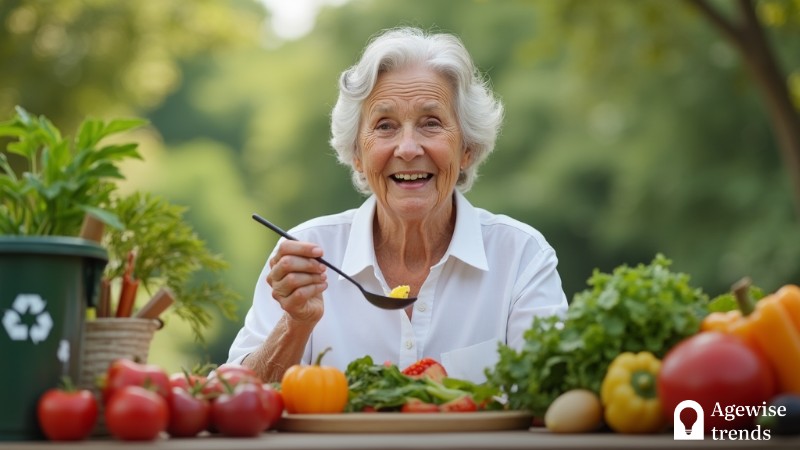Chemicals like bisphenol A (BPA) and phthalates are used to make plastics strong and flexible. However, they can get into food, especially if heated or stored for a long time. These chemicals can mess with your hormones, leading to health issues like cancer, diabetes, and neurological problems. For seniors, cutting down exposure to these chemicals is important for staying healthy.
Research shows that plastic chemicals are common in everyday foods. One study found that 86% of tested food samples had these chemicals, including dairy, meats, and even fresh produce wrapped in plastic. This points out how our food systems heavily rely on plastic packaging, which can introduce harmful substances into our food.
Endocrine-disrupting chemicals (EDCs) like phthalates and bisphenols are especially risky for older adults. These are linked to several health problems, including a higher risk of cancer, hormone issues, and metabolic disorders. For instance, phthalates are found in plastic containers and wraps, and bisphenols are often in the linings of canned goods and beverage bottles. The effects of these chemicals can build up over time, so it’s crucial for seniors to actively reduce their exposure.
Key Takeaways
Reducing exposure to plastic chemicals is crucial for seniors to maintain a healthy lifestyle, as they are linked to various health problems including cancer and hormone issues.
- Choose safer food storage options by switching from plastic containers to glass, stainless steel, or ceramic ones, and avoid microwaving in plastic or using plastic wraps.
- Select fresh and unpackaged foods whenever possible, such as buying loose produce and meat from the counter instead of pre-packed options.
- Be mindful of kitchenware by swapping plastic utensils and cookware for wood, bamboo, or stainless steel alternatives to reduce chemical exposure.
Practical steps to minimize exposure
While it may be tough to avoid all plastic chemicals, there are many ways to lower your exposure and keep yourself healthy.
Choose safer food storage options
Switching out plastic containers for glass, stainless steel, or ceramic ones is an easy and effective step. These materials don’t have harmful chemicals and work better for food storage, especially when reheating. Steer clear of microwaving in plastic or using plastic wraps since heat can cause chemicals to leak. Try silicone or beeswax wraps as safer options for covering food.
Select fresh and unpackaged foods
Buy fresh, unpackaged produce whenever you can. Pre-packaged fruits and vegetables often have plastic that can transfer chemicals. Go for loose items and bring reusable produce bags to the store. For meat and fish, purchase from the counter and ask for paper wrapping instead of pre-packed options, as butcher paper usually has fewer chemicals than plastic does.
You might also check out local farmers’ markets or community-supported agriculture (CSA) for fresh, seasonal produce. These often focus on sustainable methods and use less packaging, offering a healthier choice for you and the planet.
Be mindful of kitchenware
Apart from food packaging, kitchen items can also bring in harmful chemicals. Swap plastic utensils, cutting boards, and colanders for those made of wood, bamboo, or stainless steel. Replace non-stick cookware, which might release toxic fumes when hot, with ceramic, cast iron, or stainless steel. These changes can make cooking safer and reduce chemical exposure.
Advocating for a healthier lifestyle
Reducing exposure to plastic chemicals is just one part of the solution. Advocacy and education can bring bigger changes that help everyone’s health. By staying updated on local and national rules about food packaging, seniors can support policies that reduce harmful chemicals in products. Some states have started banning chemicals like BPA and phthalates in food containers, which could lead to more changes.
Getting involved with community groups that support sustainable food practices is a great way to help. These organizations usually share resources to cut down on plastic use and offer ways to support safer packaging options. Activities like signing petitions, writing to lawmakers, and joining public discussions can make your concerns heard and push companies to focus more on health than convenience.
Besides personal actions, back businesses that use eco-friendly and plastic-free packaging. By buying products from companies that match your values, you show the importance of sustainable practices. Look for labels showing products are BPA-free or use recyclable or biodegradable materials.
Talking to friends and family can also make a big impact. Many aren’t aware of the risks from plastic chemicals in food packaging, and a chat can encourage healthier choices. Hosting workshops or casual talks about sustainable living can spread awareness in your community.















